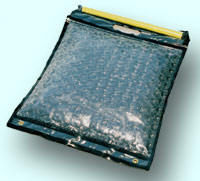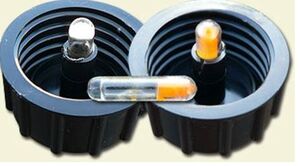Tom Sponheim (talk | contribs) (Created topic) |
Paul Hedrick (talk | contribs) |
||
| (14 intermediate revisions by 5 users not shown) | |||
| Line 1: | Line 1: | ||
| + | {{GoogleTranslateLinks}} |
||
| − | [[Image:Apatangleredone.jpg|left|150px]] |
||
| + | |||
| ⚫ | [[Solar Solutions |
||
| + | {{Updated|3|17|14}} |
||
| + | [[Image:Apatangleredone.jpg|left|250px |thumb|Solar Cookers International sells the AquaPak [http://shop.solarcookers.org/?pn=AquaPak&cn=Water+Pasteurization&p=629&c=31 online here].]] |
||
| ⚫ | [[Solar Solutions]] Laboratories announces the release of a solar water [[Water pasteurization|pasteurizer]], called the '''AquaPak''', that will cost as little as one dollar per unit to manufacture in third world countries. The AquaPak has the potential to save thousands of lives and significantly reduce illness among rural populations in nations where access to safe drinking water is scarce, because of pathogens(bacteria,viruses,and parasites,etc.) like cholera and salmonella that are found in the water |
||
Pasteurization technology was invented by Louis Pasteur in 1867, but to date efforts to develop a small, extremely low cost, easy-to-use solar pasteurizer have failed to yield a viable solution for mass distribution. The AquaPak represents a significant breakthrough in this technology. Made from low cost polyethylene plastic (also used in food preparation boiling bags) with UV inhibitors added, and air-filled bubble pak sheeting (originally developed for the packing industry), the AquaPak can heat water to temperatures beyond 67 degrees Celsius, a temperature that will kill all waterborne pathogens (bacteria, viruses, parasites) using only sunlight. By maintaining this temperature for specified time periods, the AquaPak kills a variety of pathogens present in contaminated drinking water. The edges of the plastic layers are bonded using tapered seals so the AquaPak can pass a 10 foot drop test. |
Pasteurization technology was invented by Louis Pasteur in 1867, but to date efforts to develop a small, extremely low cost, easy-to-use solar pasteurizer have failed to yield a viable solution for mass distribution. The AquaPak represents a significant breakthrough in this technology. Made from low cost polyethylene plastic (also used in food preparation boiling bags) with UV inhibitors added, and air-filled bubble pak sheeting (originally developed for the packing industry), the AquaPak can heat water to temperatures beyond 67 degrees Celsius, a temperature that will kill all waterborne pathogens (bacteria, viruses, parasites) using only sunlight. By maintaining this temperature for specified time periods, the AquaPak kills a variety of pathogens present in contaminated drinking water. The edges of the plastic layers are bonded using tapered seals so the AquaPak can pass a 10 foot drop test. |
||
| − | In tests conducted by BioVir Laboratories, San Francisco, CA, on virus contaminated water and by Environmental Engineering Laboratories, San Diego, CA, on bacterial pathogens, the AquaPak eradicated over 99.99% of the pathogens present. |
+ | [[File:AquaPak_Wapi_photo.jpg|thumb|300px|Water pasteurization indicator is included with the AquaPak]]In tests conducted by BioVir Laboratories, San Francisco, CA, on virus contaminated water and by Environmental Engineering Laboratories, San Diego, CA, on bacterial pathogens, the AquaPak eradicated over 99.99% of the pathogens present. |
Designed to be mass produced using labor in third world countries, the AquaPak can be manufactured for as little as one dollar [US]. The AquaPak employs a reusable sealed glass tube indicator—-called a [[WAPI]]—-filled with colored wax at one end that melts when heated to the required temperature, indicating the start of the pasteurization process. Depending on the availability of sunlight throughout the day, an AquaPak can produce up to 4 gallons of water per day, enough safe drinking water for a family of four. |
Designed to be mass produced using labor in third world countries, the AquaPak can be manufactured for as little as one dollar [US]. The AquaPak employs a reusable sealed glass tube indicator—-called a [[WAPI]]—-filled with colored wax at one end that melts when heated to the required temperature, indicating the start of the pasteurization process. Depending on the availability of sunlight throughout the day, an AquaPak can produce up to 4 gallons of water per day, enough safe drinking water for a family of four. |
||
| Line 13: | Line 16: | ||
''[Text taken from http://www.solarsolutions.info/aquapak/aquapak.html]'' |
''[Text taken from http://www.solarsolutions.info/aquapak/aquapak.html]'' |
||
| + | |||
| + | ==Recent news and developments== |
||
| + | *'''March 2014: AquaPak Field test Results from Nigeria''' - Professor Oluwole Agbede of the University of Ibadan, [[Nigeria]] was provided with [[AquaPak]] solar water pasteurizers by Femi Odediran, retired UNICEF water and sanitation senior adviser. Water from a borehole at Fanawole, a well at Oju Oja, and a stream at Adeosun areas were collected and all contained biological pathogens. The AquaPak solar water pasteurizers, each containing a WAPI (water pasteurization indicator), were used to heat the water to 65°C (150°F), thus, eliminating the harmful pathogens. A complete copy of Prof. Abgede’s a report is here: [[Media:AquaPak_Test_Results_-_Nigeria.pdf|Pasteurization of Water Using Solar AquaPak: A Case Study]] - ''Oluwole A. Agbede'' |
||
| + | |||
| + | *'''March 2014: Henry Ford Innovation Institute contributes AquaPaks''' - The Henry Ford Innovation Institute has contributed [[AquaPak]] solar water pasteurizers to the World Health Student Organization at Wayne State School of Medicine. Medical students from the organization will be using the AquaPaks as they travel to [[Ecuador]], [[Nicaragua]], [[Peru]], and other countries. Feedback from their use of the AquaPak in these countries will be posted on our website as it becomes available. |
||
| + | |||
| + | ==See also== |
||
| + | *[[Water pasteurization]] |
||
| + | ==Order== |
||
| + | *[[Solar Solutions]] |
||
| + | *[http://shop.solarcookers.org/?pn=AquaPak&cn=Water+Pasteurization&p=629&c=31 Solar Cookers International] |
||
==Contact== |
==Contact== |
||
| − | [[Solar Solutions |
+ | [[Solar Solutions ]]Laboratories<br> |
10080 Willow Creek Rd.<br> |
10080 Willow Creek Rd.<br> |
||
San Diego CA, 92131<br> |
San Diego CA, 92131<br> |
||
| − | [USA] |
+ | [[USA]] |
Tele: +1 (858)695 3806<br> |
Tele: +1 (858)695 3806<br> |
||
Revision as of 21:53, 17 March 2014
|
Last edited: 17 March 2014
|

Solar Cookers International sells the AquaPak online here.
Solar Solutions Laboratories announces the release of a solar water pasteurizer, called the AquaPak, that will cost as little as one dollar per unit to manufacture in third world countries. The AquaPak has the potential to save thousands of lives and significantly reduce illness among rural populations in nations where access to safe drinking water is scarce, because of pathogens(bacteria,viruses,and parasites,etc.) like cholera and salmonella that are found in the water
Pasteurization technology was invented by Louis Pasteur in 1867, but to date efforts to develop a small, extremely low cost, easy-to-use solar pasteurizer have failed to yield a viable solution for mass distribution. The AquaPak represents a significant breakthrough in this technology. Made from low cost polyethylene plastic (also used in food preparation boiling bags) with UV inhibitors added, and air-filled bubble pak sheeting (originally developed for the packing industry), the AquaPak can heat water to temperatures beyond 67 degrees Celsius, a temperature that will kill all waterborne pathogens (bacteria, viruses, parasites) using only sunlight. By maintaining this temperature for specified time periods, the AquaPak kills a variety of pathogens present in contaminated drinking water. The edges of the plastic layers are bonded using tapered seals so the AquaPak can pass a 10 foot drop test.

Water pasteurization indicator is included with the AquaPak
In tests conducted by BioVir Laboratories, San Francisco, CA, on virus contaminated water and by Environmental Engineering Laboratories, San Diego, CA, on bacterial pathogens, the AquaPak eradicated over 99.99% of the pathogens present.
Designed to be mass produced using labor in third world countries, the AquaPak can be manufactured for as little as one dollar [US]. The AquaPak employs a reusable sealed glass tube indicator—-called a WAPI—-filled with colored wax at one end that melts when heated to the required temperature, indicating the start of the pasteurization process. Depending on the availability of sunlight throughout the day, an AquaPak can produce up to 4 gallons of water per day, enough safe drinking water for a family of four.
Solar Solutions will seek to align this manufacturing technology with international government authorities and humanitarian health organizations, such as the Global Alliance For Africa, United Nations, World Health Organization, the International Red Cross, the Peace Corps, World Vision and others. While US pharmaceutical companies are striving to provide affordable antibiotics to these poorer nations, the affected populations are frequently taking the medications with pathogen-laden water, which can cause diarrhea and death by dehydration. The AquaPak provides a realistic long-term solution by eliminating the reintroduction of the offending pathogens to the digestive system.
The AquaPak has been developed by the Thermal Applications Group at Solar Solutions Laboratories in San Diego, CA. Solar Solutions was founded in 1996 by inventor and entrepreneur, Frank Husson, to provide diverse solutions for global water purification through solar technologies.
[Text taken from http://www.solarsolutions.info/aquapak/aquapak.html]
Recent news and developments
- March 2014: AquaPak Field test Results from Nigeria - Professor Oluwole Agbede of the University of Ibadan, Nigeria was provided with AquaPak solar water pasteurizers by Femi Odediran, retired UNICEF water and sanitation senior adviser. Water from a borehole at Fanawole, a well at Oju Oja, and a stream at Adeosun areas were collected and all contained biological pathogens. The AquaPak solar water pasteurizers, each containing a WAPI (water pasteurization indicator), were used to heat the water to 65°C (150°F), thus, eliminating the harmful pathogens. A complete copy of Prof. Abgede’s a report is here: Pasteurization of Water Using Solar AquaPak: A Case Study - Oluwole A. Agbede
- March 2014: Henry Ford Innovation Institute contributes AquaPaks - The Henry Ford Innovation Institute has contributed AquaPak solar water pasteurizers to the World Health Student Organization at Wayne State School of Medicine. Medical students from the organization will be using the AquaPaks as they travel to Ecuador, Nicaragua, Peru, and other countries. Feedback from their use of the AquaPak in these countries will be posted on our website as it becomes available.
See also
Order
Contact
Solar Solutions Laboratories
10080 Willow Creek Rd.
San Diego CA, 92131
USA
Tele: +1 (858)695 3806
http://www.solarsolutions.info/aquapak/aquapak.html
